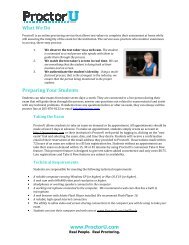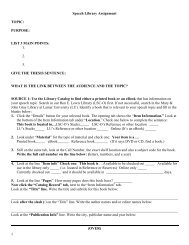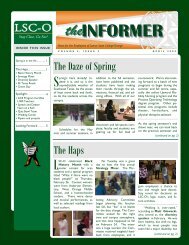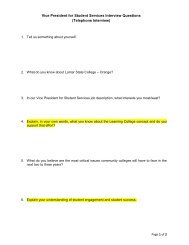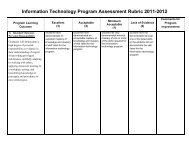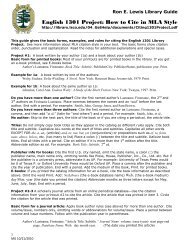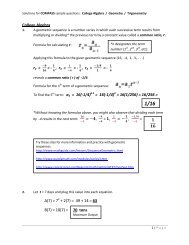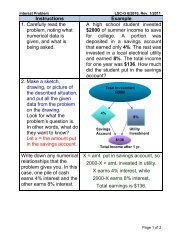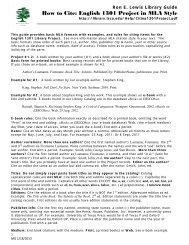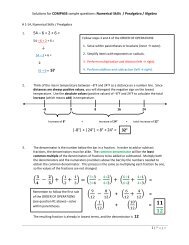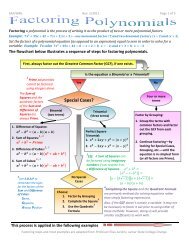Thinking Critically about Web InformationâApplying the ... - Library
Thinking Critically about Web InformationâApplying the ... - Library
Thinking Critically about Web InformationâApplying the ... - Library
- No tags were found...
Create successful ePaper yourself
Turn your PDF publications into a flip-book with our unique Google optimized e-Paper software.
Ron E. Lewis <strong>Library</strong><strong>Thinking</strong> <strong>Critically</strong> <strong>about</strong> <strong>Web</strong> Information—Applying <strong>the</strong> CRAAP Test*When you search <strong>the</strong> <strong>Web</strong>, you’re going to find a lot of information…but is it credible and reliable? Use thisguide to help you determine this for yourself. Give your <strong>Web</strong> page a score based on this point system. Isyour <strong>Web</strong> source credible and reliable or is it a bunch of … ? SCORE _______Checking for C-R-A-A-P! POINTS: 0 1 2 3Currency or TimelinessHow important is it for yourtopic to have recentinformation? Science,technology, and healthinformation need to be asrecent as possible. If yes,how current is <strong>the</strong>information?There is no indicationof when <strong>the</strong> site wascreated or updated.The site wascreated is over 5years ago with nodate given forupdating.The site wascreated, revised orupdated within <strong>the</strong>last 5 years. If <strong>the</strong>yare citing sources,<strong>the</strong>y are alsorecent.The site was created,revised or updatedwithin <strong>the</strong> last 2years. If <strong>the</strong>y areciting sources, <strong>the</strong>yare also recent.RelevanceIs this <strong>the</strong> information youneed for your topic?Consider <strong>the</strong> type ofinformation needed(primary sources orsecondary sources)statistics, history orbackground information.Authority.Locate <strong>the</strong> author orsponsor and Google <strong>the</strong>name to find out more.What else have <strong>the</strong>ypublished on <strong>the</strong> topic? Are<strong>the</strong>re any credentials for<strong>the</strong> person to establish<strong>the</strong>m as expert? Is it <strong>the</strong>main organization thatprovides information <strong>about</strong>a topic?AccuracyAre <strong>the</strong>re any sources citedfor <strong>the</strong> information?Are images/photos labeledand credited?PurposeIs <strong>the</strong> information fact oropinion? Is it stating a pointof view, promoting an idea,service or product? If youneed opinions, <strong>the</strong>nconsider <strong>the</strong> author’sauthority, <strong>the</strong>ir use of logicand provision of evidencefor <strong>the</strong>ir opinions.It mentions my topicbriefly but not muchelse. Or it isn’t <strong>the</strong>type of information Ineed. Or it isn’tenough information.There is ei<strong>the</strong>r noauthor, or <strong>the</strong> authoris possibly a studentor an ordinaryperson publishing on<strong>the</strong> <strong>Web</strong> withoutexpertise. Or <strong>the</strong>organization is notknown. Text errorsindicate <strong>the</strong> author isnot an expert.Information isprovided with noindication as towhere it comes from.The purpose of <strong>the</strong>page is to present abiased point of view,sell or promote anidea, service orproduct. It is not afactual or balancedpoint of view. Theopinion is ei<strong>the</strong>r notbacked up with factsor <strong>the</strong> facts aredistorted.It provides someinformation, but it’snot enough, or it’snot <strong>the</strong> right type ofinformation.Author is namedbut with nocredentials. Or <strong>the</strong>organization is ofquestionableauthority. <strong>Web</strong>groups can name<strong>the</strong>mselves withnames that soundlike o<strong>the</strong>r credibleorganizations.There is a vaguereference to <strong>the</strong>information source.Assumptions mustbe made as to <strong>the</strong>source.The purpose of <strong>the</strong>page is to sell orpromote something,but it also providessome good factualinformation. Orexpressed opinion issomewhat logicaland presents someevidence.It provides most ofwhat I need, but Istill need more orano<strong>the</strong>r type ofinformation.Author is namedbut <strong>the</strong> degree ofexpertise is not thathigh.Or, <strong>the</strong>organization, iswell-known, and but<strong>the</strong> degree ofexpertise on thissubject is not clear.There is a generalstatement <strong>about</strong> <strong>the</strong>source of <strong>the</strong>information but notenough to locate it.The purpose of <strong>the</strong>page is to educateor to offer mostlyfactual information.Or expressedopinion is logicalpresenting enoughevidence for <strong>the</strong>opinion.It is exactly on <strong>the</strong>subject, is <strong>the</strong> rightamount of informationand <strong>the</strong> right type ofinformation.The author’scredentials are givenand clearly indicatethat he/she is anexpert.Or <strong>the</strong> organization iswell-known and highlycredible on <strong>the</strong> topic.There is a good list ofsources that can belocated. Images/photos are labeledand sources given.The purpose of <strong>the</strong>page is to provideinformation of ascholarly, academic orat least high quality.Evidence for opinionis factual, presentedas numbers in charts,graphs, tables, orstatistics or adequateevidence for <strong>the</strong>opinion.Score Total/Meanings: 0 to 3 pointsVery questionablesource. Don’t use.4 to 7 pointsOK for info, butdon’t cite it.8 to 11Good source touse and cite.12 to 15Excellent source touse and cite.*This rubric uses a modified version of <strong>the</strong> CRAAP Test created by Meriam <strong>Library</strong> at California State University-Chico.
Evaluation of <strong>Web</strong> pages and sites: Questions for <strong>the</strong> CRAAP test—CURRENCY/ TIMELINESS: When <strong>the</strong> information was published and <strong>the</strong> importance <strong>the</strong> date asit relates to <strong>the</strong> topic.Is currency important for your topic? Is it a science, technology, or health-related topic?When was <strong>the</strong> <strong>Web</strong> page originally published, last updated or revised?Are all of <strong>the</strong> links on <strong>the</strong> page functional? Can you determine if <strong>the</strong>re is new informationon <strong>the</strong> page?REVELANCE/ COVERAGE OF THE TOPIC: The degree to which <strong>the</strong> information fulfils yourinformation need.How relevant to your topic is <strong>the</strong> information? How on-topic is it?Can you find <strong>the</strong> same or better information in ano<strong>the</strong>r source?Is it <strong>the</strong> type of information needed? (i.e. background, detailed history, statistics, primarysource)Is <strong>the</strong>re enough information or do you need to find additional information on your topic?AUTHORITY: Who is providing this information and are <strong>the</strong>y a reliable source.Who is responsibility for <strong>the</strong> information on <strong>the</strong> page (<strong>the</strong> author, creator, sponsor?)Are <strong>the</strong>re any author credentials given? Can you determine <strong>the</strong> author’s age, level ofexpertise, etc.Are <strong>the</strong>y experts on <strong>the</strong> subject? “Google” <strong>the</strong> author or site sponsor’s nameto find out more.If <strong>the</strong>re is a group or organization (called a corporate author) creating <strong>the</strong> page, establish<strong>the</strong> group’s authority. “Google” <strong>the</strong> name. Are <strong>the</strong>y a well-known, reputable organizationfor this subject? Learn <strong>about</strong> <strong>the</strong> organization on <strong>the</strong>ir home page. Look for “About Us” on<strong>the</strong> home page.ACCURACY: The truthfulness and correctness of <strong>the</strong> information.Where did <strong>the</strong> information on <strong>the</strong> page come from? Did <strong>the</strong> sponsor/author of <strong>the</strong> pagecreate <strong>the</strong> information? If not, <strong>the</strong> original source should be cited on <strong>the</strong> page.Are <strong>the</strong>re cited sources or links to <strong>the</strong> original source of <strong>the</strong> information?Can you verify any of <strong>the</strong> information in o<strong>the</strong>r independent sources or from your ownknowledge?PURPOSE: The reason <strong>the</strong> <strong>Web</strong> page/site exists, and <strong>the</strong> point of view of <strong>the</strong> author/sponsor.Is <strong>the</strong> page promoting something that might cause biases? (such as opinions, products,ideas)Is <strong>the</strong> information based on facts or is it opinion? If opinion, is it based upon logicalthinking? Is <strong>the</strong> author using good evidence for <strong>the</strong>ir opinion?What is <strong>the</strong> purpose of <strong>the</strong> <strong>Web</strong> site sponsoring this page? Is <strong>the</strong> domain for <strong>the</strong> site a.org (an organization), .edu (an educational site), .gov (a federal government site), .mil(a military site), .com (a commercial site), .net (a web-sponsoring site), .TV (a televisionsite)… to name <strong>the</strong> most well-known domains. O<strong>the</strong>r domains describe state governmentsites (Texas government sites: state.tx.us) and sites from o<strong>the</strong>r countries that use <strong>the</strong>country abbreviation as <strong>the</strong> domain.




